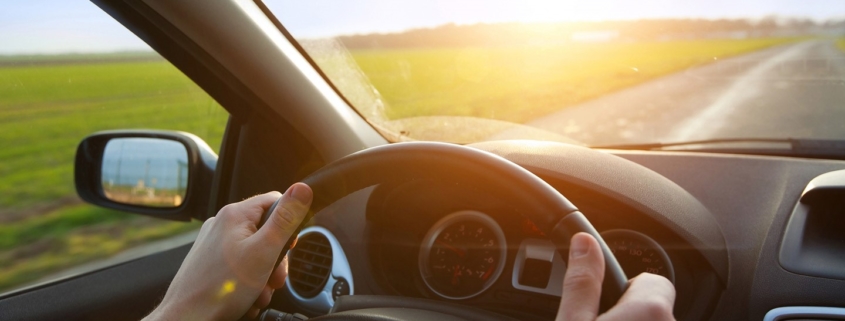Who is to Blame for Sun Glare Accidents?
As we get into the fall and winter months, sun glare becomes more of a problem for drivers. Shorter days means that our drives to and from work are often disrupted by the bright sunlight that invades our vehicle through our front windshield. This can inhibit our ability to drive safely, and it can make it very difficult to deal with what would otherwise be routine road and traffic conditions.
Sun glare is especially dangerous during this time of year. Having to drive while facing the glare of the sun is similar to driving in other hazards such as fog, heavy rain, or snow. When these conditions are present, it is all you can do to safely navigate the roadways and avoid hitting a pedestrian, bicyclist, or another vehicle.
Bright sunlight contributes to numerous auto accidents each year. The exact number of accidents is hard to determine, however, because sun glare is not always listed as a contributing factor on police reports. The National Highway Transportation Safety Administration (NHTSA) puts the figure at around 300, but organizations like AAA dispute this figure, and they believe the real number is much higher.
A comprehensive study conducted by the National Institute of Health (NIH) looked at hospitalizations from motor vehicle crashes between 1995 and 2014. This study found that bright sunlight is present in approximately one-third of all crashes with injuries that happen during daylight hours. These findings indicate that the problem of sun glare is far more widespread than some officials would like to acknowledge.
Who is Responsible for a Sun Glare Accident?
This is a question that often comes up when there is an accident that results from bright sunlight. The driver who was blinded by the glare may have crashed into someone or something else, but is it their fault? After all, sunlight is a natural occurrence, so wouldn’t a sun glare accident be considered an “act of God”?
On the surface, this assertion might seem logical. Sunlight is natural, and when and where the sun shines each day is beyond human control. So, in the most technical sense, you might be able to call sun glare an “act of God.” Legally, however, this argument does not hold water.
To use the “act of God” defense to argue against liability for a car accident, the accident needs to be caused by an extraordinary natural event that is unforeseeable. This would be something like an earthquake or flood that no one saw coming ahead of time. If an accident is caused exclusively by an event like this, then you might have a viable argument.
Sun glare, of course, does not fit this description. The sun rises every morning and sets every afternoon/evening. These events are predictable, they happen every day, and it is not hard to know approximately what time each day they will happen. So, if you are driving east in the morning or west in the evening, there is a good chance you might encounter bright sunlight, and you have a duty to take reasonable steps to prepare for this possibility.
Failure to take reasonable precautions to avoid a sun glare accident would constitute negligence; and if you are determined to be totally at fault for any resulting accident (in other words, no other person or party contributed to it), you would be liable for damages under Alabama law.
Preventing Accidents Caused by Bright Sunlight
With the dangers of sun glare accidents at their highest this time of year, every driver should take steps to minimize the chances of this type of accident occurring:
- Clean off the streaks and marks from your windshield regularly;
- Replace any worn or broken wiper blades;
- Always have plenty of washer fluid when you are driving;
- Wear sunglasses that significantly reduce glare, such as polarized sunglasses;
- Use your sun visor and turn it to its sides when necessary to reduce glare;
- Drive slowly and allow plenty of space between your vehicle and other vehicles, bicyclists, and pedestrians;
- If possible, change your drive time and route slightly to reduce the amount of time you have to spend looking at bright sunlight.
Injured in a Sun Glare Accident in Alabama? Speak with an Experienced Auto Accident Lawyer
If you or someone close to you has been injured in a car accident that was caused by someone else’s negligence, you may be entitled to compensation. To find out what your legal rights and options are, contact Burns, Cunningham, & Mackey for a free consultation and case assessment. Call our office today at (251) 260-3815, message us online, or stop by our Mobile office in person at your convenience to speak with a member of our legal team.





Leave a Reply
Want to join the discussion?Feel free to contribute!